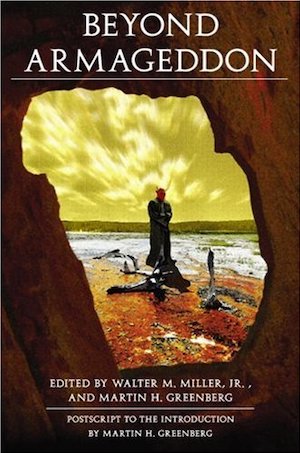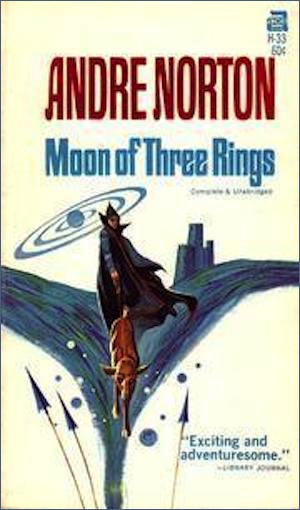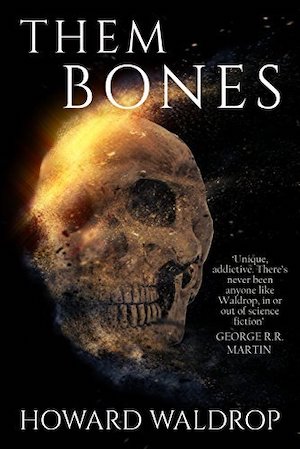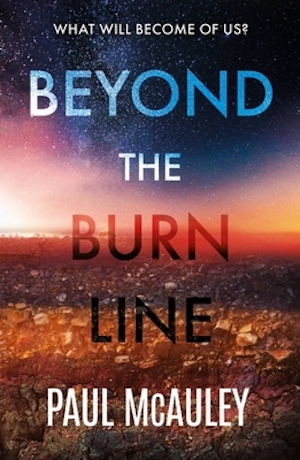One of the rewards of travel and tourism is the opportunity to admire ruins of great antiquity. Across the planet, edifices remain to attest to the achievements of past civilizations now lost to history. Indeed, many of these sites are so impressive that a person could be forgiven for looking around at modern, well-maintained, and occupied buildings to ponder how they might best be converted into relics along the lines of the Roman Forum, Harappa, and Chichén Itzá.
The three most important ingredients? Time, bad luck, and poor judgement.
“The Music Master of Babylon” by Edgar Pangborn (1954)
Collected in Beyond Armageddon (1986)

Having advanced to the point of launching not one but two interstellar missions (fates unknown), the civilizations of the world then proceeded to comprehensively mismanage climate change while edging ever closer to the Final War. That Final War came in 2070, freeing the vast majority of humanity from their daily woes.
Brian Van Anda has lived for a quarter century in the Museum of Man, in a decaying Manhattan isolated by ocean rise and depopulated by nerve gas but otherwise spared the more violent weapons that scoured less fortunate communities. Now after a quarter century, visitors have come calling. What will the savage children of tomorrow make of a relic of a civilization about whose existence they never learned?
Pangborn fans might recognize this as a rough draft of what later became Pangborn’s Darkening World. One might see this as a retelling of Benet’s “By the Waters of Babylon,” told from the perspective of someone who still remembers the civilization responsible for the ruins. The story’s treatment of climate change may seem odd to modern eyes: despite the clear and present threat presented by melting icecaps, humans spent the 21st century kidding themselves that “the flood years have passed their peak and a return to normal is expected.” Where do SF authors get their crazy ideas?
A new normal does seem to be firmly established by the end of the novel, so perhaps the Panglossian pundits were correct after all (in a way).
Moon of Three Rings by Andre Norton (1966)

To Free Trader eyes, Yiktor is a familiar sort of world. Like so many other planets, Yiktor was once home to an advanced civilization. Like so many other planets, that once-great civilization has been reduced to ruins occupied by barbarians, with the occasional treasure waiting to be uncovered by diligent visitors. Easy money!
Experience misleads the Free Traders. Other civilizations fell. Yiktor’s society was battered, but (all evidence to the contrary) was not extinguished. It was transformed. The nomadic Thassa are not the primitives the Free Traders believe. While the Thassa may have put city-building behind them, they turned to arcane technology for which the overconfident Free Traders are unprepared.
In the Free Traders’ defense, “the great civilization became decadent and self-destructed” is a pretty good bet in most Norton narratives. Andre Norton didn’t have much faith in the longevity of technological civilizations. Planets that appear healthy in one novel could be ruins when Norton revisited them centuries later. In this specific case, however, the Thassa manage to find a way out of the cycle of rise and fall.
Hope by Klaatu (1977)
As one might expect from the title of progressive rock band Klaatu’s concept album Hope, the musical narrative begins on an upbeat note, extoling the virtues of exploration. Two tracks later, the invention of a stupendously fast star drive is revealed in “Around the Universe in Eighty Days.” What wonders await our optimistic explorers?
Among them, a space-based lighthouse warning unwary starships of the scattered remnants of a shattered world. Living within, its keeper—the only remaining member of his once highly advanced species. Presumably mistakes were made. If the narrative is to be believed, mistakes will be made again, despite which the lyrics for some reason encourage listeners to embrace hope rather than the far more prudent option of profound concern about where history is taking us all.
Klaatu (comprised of John Woloschuk, Dee Long, and Terry Draper) is a Canadian band, the product of an interesting period in Canadian entertainment history. Rather than resign themselves to cultural domination by the larger US, the Canadian government of the day instituted Canadian content regulations to encourage Canadian culture. This effort was to a surprising degree successful, at least for a time. Perhaps hope is sometimes not pathological.
Them Bones by Howard Waldrop (1984)

The good news is that in 2002, the nuclear weapons into which the great powers invested so much money proved that they were not a boondoggle. The ensuing thermonuclear exchange was every bit the apocalypse which its architects expected. The single drawback, a very minor one, is that only a few people survived it and all the evidence suggests their survival will prove short-lived.
Not to worry! Time travel provides access to a pre-apocalyptic, pre-Columbian Exchange past and with it, salvation. Perhaps. More likely, however, would-be colonizers from the future will bring with them the seeds of a non-nuclear but equally horrific calamity, dooming the innocent past almost as thoroughly as they did the future.
Many writers of the long ago treated American Indians as a typographical error on the page on which American history was intended to be inscribed. Waldrop rejects this approach. Not that this means the cultures who encounter the time travellers will survive the meeting, but a sense of what will be lost is effectively conveyed.
Beyond the Burn Line by Paul McAuley (2022)

Human achievements in global transformation will be preserved as the eponymous Burn Line for as long as the geological record in which our final errors were recorded survives. Despite our best efforts to streamline the Earth’s ecosystems, complex life not only survived but flourished. Within a mere six hundred thousand years, intelligent bears dominated the Earth. When they fell in their turn, intelligent raccoons took the bears’ place.
Among human achievements independently recreated by the raccoons: academia. Pilgrim Saltmire is an ambitious scholar who hopes to complete his late master’s research into mysterious entities nicknamed the Visitors. Life is often cruel. Pilgrim’s path to enlightenment will be a very convoluted journey, at the end of which wait answers Pilgrim would have been happier not knowing.
Less than six hundred thousand years from planetary apocalypse to successor civilizations is pretty good. Also, while the bears seem to have been a rather unpleasant lot, the raccoons are the sort of people about whom one would like to read more stories. Sadly, I think this is a standalone.
***
Humans have been speculating about the fall of civilization for a very long time. It would not surprise me to find some doleful narrative about the days to come depicted in a Çatalhöyük mural. Five examples cannot hope to cover the whole of the field. Feel to mention your favourites in comments, which are as ever, below.
In the words of fanfiction author Musty181, four-time Hugo finalist, prolific book reviewer, and perennial Darwin Award nominee James Davis Nicoll “looks like a default mii with glasses.” His work has appeared in Interzone, Publishers Weekly and Romantic Times as well as on his own websites, James Nicoll Reviews (where he is assisted by editor Karen Lofstrom and web person Adrienne L. Travis) and the 2021 and 2022 Aurora Award finalist Young People Read Old SFF (where he is assisted by web person Adrienne L. Travis). His Patreon can be found here.










